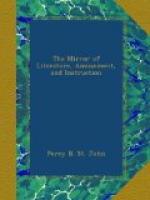[3] Arnott’s Elements of Physics.
Lord Brougham, in his Introduction to the Library of Useful Knowledge, characterizes this as a process, by which more money has been made in a shorter time, and with less risk and trouble, than was ever perhaps gained from an invention; and as “the fruit of a long course of experiments, in the progress of which known philosophical principles were constantly applied, and one or two new principles ascertained."[4]
[4] Objects, Advantages, and
Pleasures of Science. In the
first edition, the inventer
is erroneously stated to be Edward
Howard.
The scene of this discovery was, in all probability, the Deepdene, near Dorking, the retreat of the late Mr. Thomas Hope, the author of Anastasius. Here the Hon. Mr. Howard, brother of the Duke of Norfolk, resided at the commencement of the last century, and is stated to have enjoyed that philosophical retirement which may be described as the happy haven of a truly great mind. He planted a portion of the grounds, the greater part of the estate being so admirably disposed by nature as almost to forbid the fashioning of men’s hands. At Mr. Howard’s death, the estate descended to the Duke of Norfolk, who sold the property, in 1791, to the late Sir William Burrell, whose lady wrote the following lines, which are on a tablet in the grounds:
“This votive Tablet
is inscribed to the memory of the
Honourable Charles Howard,
who built an oratory and laboratory
on this spot: he died
at the Deepdene, 1714.
If worth, if learning, should with fame
be crown’d,
If to superior talents, fame
be due,
Let Howard’s virtues consecrate
the ground
Where once the fairest flowers
of science grew.
Within this calm retreat, th’ illustrious
sage
Was wont his grateful orisons
to pay,
Here he perused the legendary page,
Here gave to chemistry the
feeling day.
Cold to ambition, far from courts remov’d,
Though qualified to fill the
statesman’s part,
He studied nature in the paths he lov’d,
Peace in his thoughts, and
virtue in his heart.
Soft may the breeze sigh through the ivy
boughs
That shade this humble record
of his worth;
Here may the robin undisturbed repose,
And fragrant flowers adorn
the hallow’d earth.




